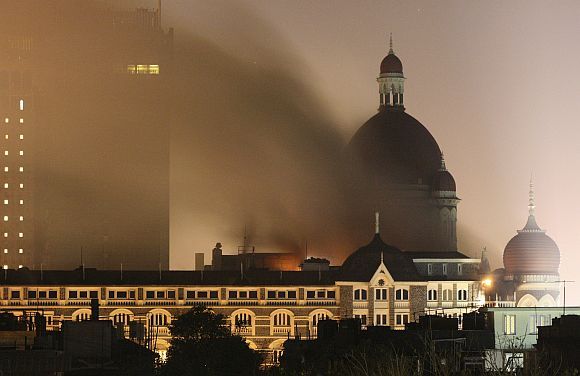 | « Back to article | Print this article |
'Peace talks with Pakistan are like accepting a dinner invitation from cannibals and hoping to return alive,' says Colonel Anil A Athale (retd).

As the country marks the ninth anniversary of the 26/11 Mumbai terror attacks, there is much that has changed and much that hasn't.
Surely, the country is better prepared to face a similar attack with special police units and the National Security Guard. The surveillance systems are much better and we have a central government in place that has refused to be seduced by the 'Asoka syndrome' (burning desire for peace with Pakistan).
But on the other side of the border there is a sense of déjà vu. The mastermind, chief planner and inspirer of the November 26-29, 2008 attacks by Pakistani terrorists in Mumbai, Muhammed Saeed, has just been released from detention, showing that Pakistan is no hurry to either prosecute or even detain the plotters.
The level of religious fanaticism has increased in that country. For nearly a month, an Islamic group has been blocking the highway near the capital demanding the resignation of its law minister Zahid Hamid for the 'sin' of omitting a reference to Prophet Mohammed in a constitutional bill, and the Pakistani government and its all-powerful army are either unable or unwilling to take any action.
It is well known it is the army that rules Pakistan. I and most Indian professional military men will admit that the Pakistani armed forces are an efficient and tactically proficient organisation, and an effective killing machine armed with modern weapons.
Despite India's numerical superiority, a military conquest of Pakistan is beyond its means. With the nuclear dimension, an all-out war will certainly result in major damage for India, even if Pakistan may well cease to exist. There is no tangible gain in this course of action.
I will not be divulging any national secret by asserting that neither the political nor the military leadership of India has any such plans. And the Pakistani army lacks the strength to win against India.
During the 1990 Kashmir crisis, then CIA chief Robert Gates visited Pakistan and told the military there that the Americans have carried out hundreds of computer simulations of India-Pakistan war and in each and every scenario the end result was Pakistan's defeat.
But unlike India, Pakistan's military believes that India is too divided and will disintegrate. Pakistan mistakes the din and noise of democracy for internal weakness. Right from Ayub Khan in the 1950s, this has been an article of faith for Pakistan's military.
This still leaves the issue of annexing Kashmir. Irrespective of morality or otherwise, the material fact is that no amount of internal unrest in the border state can loosen India's grip so long as the rest of the country continues to support the Kashmir policy.
Be it Vietnam, the liberation of Bangladesh or the takeover of Afghanistan from Najibullah by the Taliban, the final blow needed an intervention by regular armed forces.
Pakistan has tried to wrest Kashmir from India in 1947, 1965 and 1999 (through the Kargil skirmish) and failed. Yet, Pakistan's professional army and its military establishment continue on the path of conflict with India despite knowing that victory is not achievable.
History offers a clue to this apparent contradiction. In its deepest convictions and mindset, Pakistan considers itself to be an heir to the Delhi sultanate and Mughal empire.
In a broad brush view of the Middle Ages, the army was at the centre of Muslim rule in north India. The rulers ruled with help of their military might and were never concerned with seeking public support.
With the notable exception of two rulers, Sher Shah Suri and Akbar who carried out some works of public benefit, the rest were never concerned with the welfare of their subjects.
Constant warfare, either in Afghanistan or in campaigns of conquest in south India, marked their rule. There was never a period when the armies were not fighting.
Chanakya has cynically defined peace as an interlude between two wars, but in case of Muslim rule in India, peace was not even an interlude.
Is it any wonder that their 800-year rule in parts of India produced no scientific or economic advance or any work of public welfare?
The State of Pakistan seems to be faithfully following this model. In the last 20 years or so, as external conflict has been of less intensity, Pakistan has been busy killing its own people.
Fighter aircraft, artillery and tanks have been regularly used in campaigns in north and south Waziristan. In these wars, over 80,000 Pakistanis have been killed (these figures are valid till 2015), including 5,400 soldiers, the latter figure nearly equal to those killed in the 1971 War.
Ultimately, besides all these political factors, it appears that the religious dimension is an equally important reason for Pakistani hostility towards India. The Hadith, a record of the traditions and sayings of Prophet Mohammed, makes a reference to Ghazwa e Hind, or conquest of India, in the Book of Jihad, which is often used to infuse terrorism directed at India with religious hues.
General Pervez Musharraf in a candid moment once remarked that even if the Kashmir issue was resolved, peace between India and Pakistan was not possible. Peace talks with Pakistan are like accepting a dinner invitation from cannibals and hoping to return alive.
Once India understands the permanent nature of Pakistani hostility and its logic, we can work out our strategies to deal with it. The nine years post 26/11 ought to teach us a lesson that peace with Pakistan is not possible due to structural and ideological reasons.
The best course for India is to wait out the implosion that is bound to take place sooner than later. We have to be prepared to ensure that the fallings debris from a collapsing State do not damage us.
Colonel Anil A Athale (retd) is a military historian